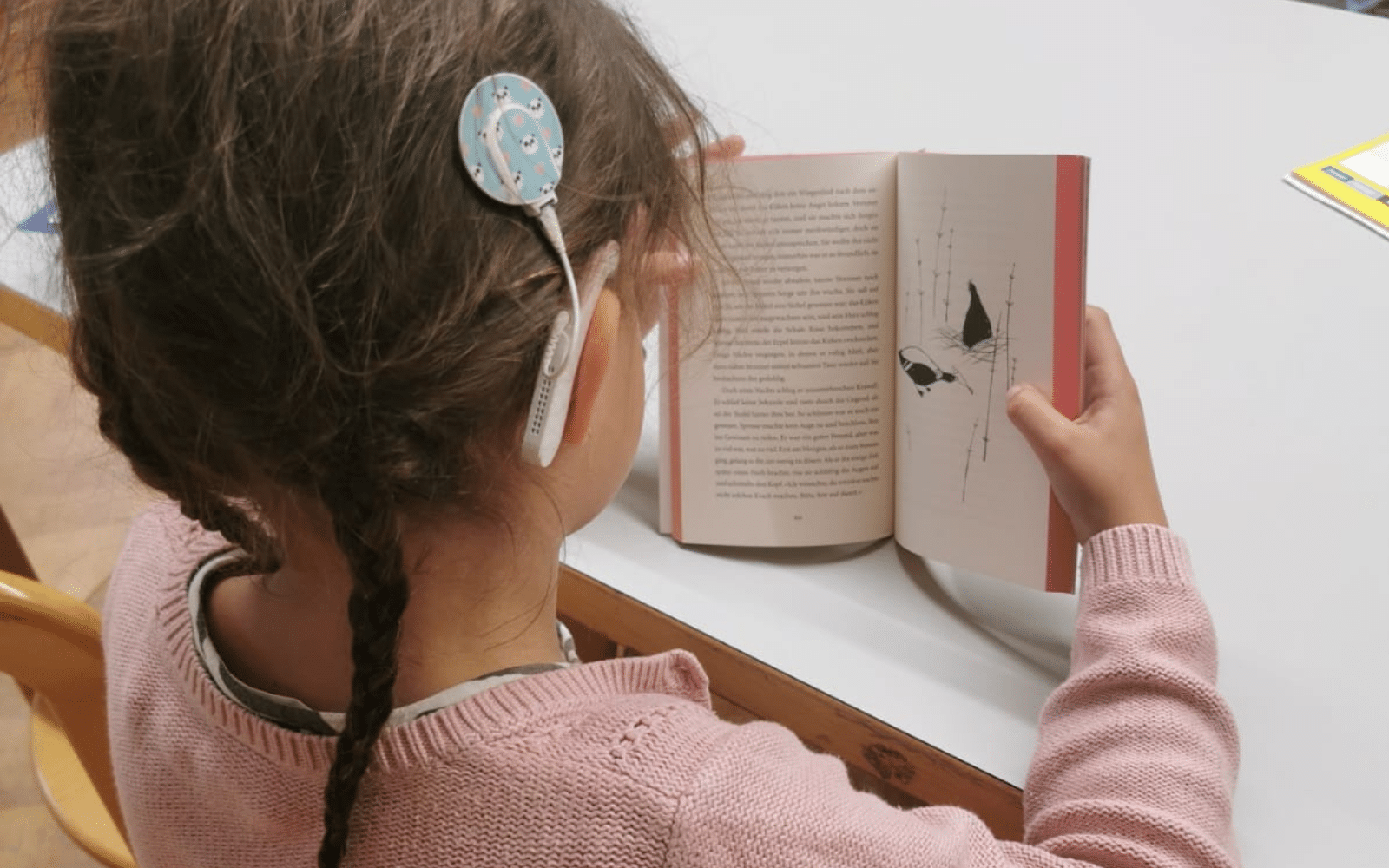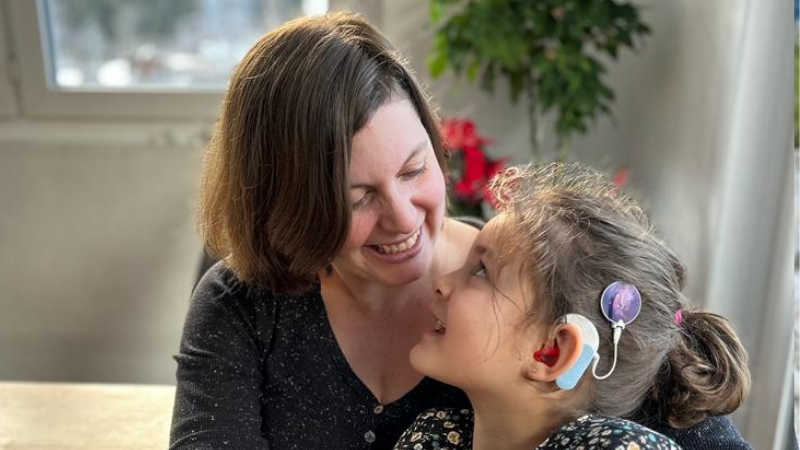
MED-EL
Published Sep 04, 2024
Kindergarten and School With Cochlear Implants
We interviewed parents of cochlear implant users about their children’s kindergarten and school experiences. In this article, they share some insights and tips on how to have a successful school year with cochlear implants.

Every child’s journey with cochlear implants is unique and filled with its own challenges and triumphs. Today, we introduce you to two remarkable young CI users from Switzerland: Clara and Liam. Their stories show how cochlear implants have empowered them to lead active lives without having to miss out on sound.
Clara’s and Liam’s Paths to Cochlear Implants
Clara’s Story
As soon as Jasmine, Clara’s mother, found out about her daughter’s hearing loss, she wanted to ensure that Clara could enjoy the world of sounds as soon as possible. Here’s our interview with her:
MED-EL: How did you find out about Clara’s hearing loss?
Jasmine: Clara was born with hearing loss and initially used hearing aids. When she was 7 months old, genetic testing revealed that she would not regain her hearing.
MED-EL: Why did you decide to go for cochlear implants?
Jasmine: We accepted Clara’s hearing loss very quickly and decided that cochlear implants would provide her with the best opportunities in life.
MED-EL: How is her life with cochlear implants?
Jasmine: Today, Clara is 7 years old and a very active child who loves skiing, cycling, and spending time with her friends . Thanks to her SONNET 2 audio processors, she has overcome hearing loss and is living a life like every other child.

Liam’s Story
Patrik, Liam’s dad, still remembers his son’s first words after receiving CIs. But there was a time when the family was overwhelmed with the situation and wanted to find a solution for Liam. Check out Patrik’s experience:
MED-EL: How did you find out about Liam’s hearing loss?
Patrik: Liam lost his hearing at the age of 2 following a lung infection. After undergoing antibiotic treatment, we noticed a decline in his hearing, which subsequent tests confirmed.
MED-EL: Why did you decide to go for cochlear implants?
Patrik: We were shocked to find out about Liam’s hearing loss but knew we needed a solution. As soon as we found out about cochlear implants from our doctor, we decided to get Liam implanted. Thanks to his SONNET 2 audio processors, he spoke his first words, and we knew we needed to be there to support him with his speech development.
MED-EL: How is Liam’s life with cochlear implants now?
Paatrik: Today, Liam is 14 years old. He goes to school, plays football and floorball, and enjoys listening to music. He feels comfortable and included during school lessons, as he gets the support he needs.

Auditory Rehabilitation Before Kindergarten and School
Getting ready for kindergarten or school involves much more than packing a bookbag. For Clara and Liam, auditory rehabilitation was a key step in ensuring they could thrive in their new environments. Here’s how they got started:
- After activation, Clara and Liam had their audio processors fitted to their specific needs.
- Prior to starting kindergarten/school, both children received enthusiastic support from their large families. Daily life included fun listening exercises, frequent conversations, and various auditory inputs, like music.
- Specialists in developing listening and spoken language supported the families on their hearing journeys.
Preparing for Kindergarten and School
Ensuring a smooth transition into kindergarten or school required proactive steps from Liam and Clara’s parents. Here are their top tips:
- Maintain open communication with teachers to learn about upcoming plans.
- Review classroom topics and songs with your child in advance to ensure they understand the vocabulary.
- Inform both the teachers and the students about your child’s hearing loss and cochlear implants, and show them how to best support your child in the classroom.
- Keep your child motivated about school by discussing the importance and joy of hearing and speech in daily life.
- Encourage an open attitude towards hearing loss and cochlear implants and promote direct communication. This way, your child will learn to share their experiences and answer questions confidently, strengthening their identity.
- Encourage your child to get to know their audio processor and learn how to do simple troubleshooting.
Support During Lessons
Once in the classroom, continuous support is crucial for children with cochlear implants. It’s not just family that can assist your child—teachers and classmates can help too:
- Teachers can use assistive listening devices such as the Roger FM system by Phonak or AudioLink to ensure your child can hear them clearly from anywhere in the room.
- Teachers should encourage regular listening breaks to prevent auditory fatigue. This way, your child can feel free to take off their audio processor at agreed times during the school day. Teachers can also encourage your child to ask for help if they don’t understand something.
- A classroom buddy system can be helpful for communication, especially in emergencies, or outside the classroom at large assemblies or sports lessons.
Supporting a child with a cochlear implant as they navigate kindergarten or school requires thoughtful preparation, open communication, and continuous support. Clara’s and Liam’s tips can help your child prepare for a successful school year.
For more tips and tricks, check out our Rehabilitation Downloads for Children or get in touch with your local MED-EL team.
References

MED-EL
Was this article helpful?
Thanks for your feedback.
Sign up for newsletter below for more.
Thanks for your feedback.
Please leave your message below.
Thanks for your message. We will reply as soon as possible.
Send us a message
Field is required
John Doe
Field is required
name@mail.com
Field is required
What do you think?
© MED-EL Medical Electronics. All rights reserved. The content on this website is for general informational purposes only and should not be taken as medical advice. Contact your doctor or hearing specialist to learn what type of hearing solution suits your specific needs. Not all products, features, or indications are approved in all countries.

MED-EL

MED-EL


